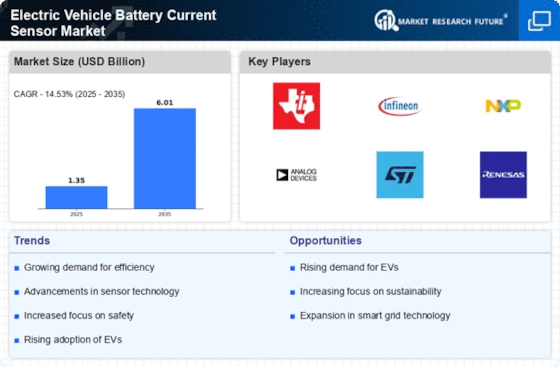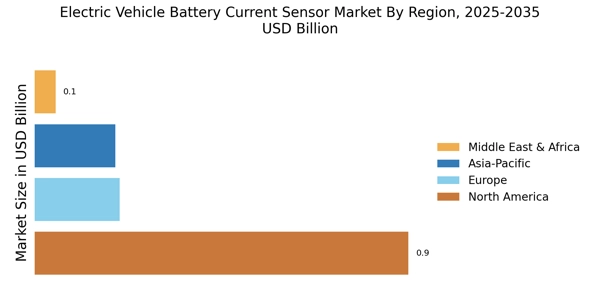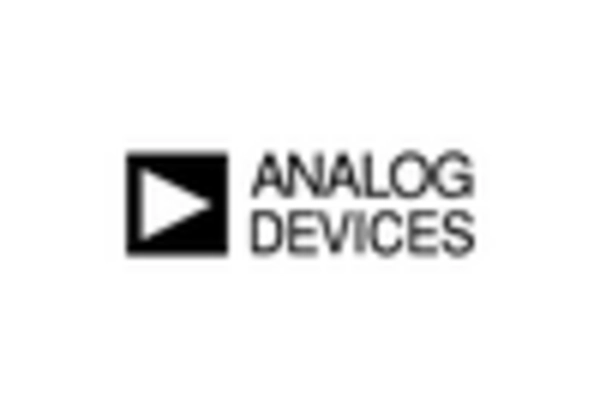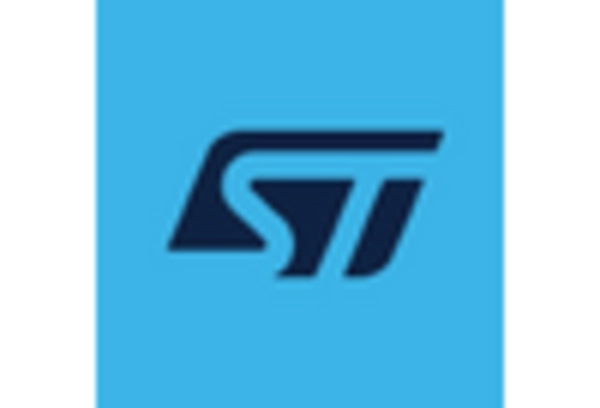Rising Demand for Electric Vehicles
The increasing consumer preference for electric vehicles (EVs) is a primary driver for the Electric Vehicle Battery Current Sensor Market. As more individuals and businesses transition to EVs, the need for efficient battery management systems becomes paramount. This shift is evidenced by the projected growth in EV sales, which is expected to reach over 30 million units annually by 2030. Consequently, the demand for battery current sensors, which play a crucial role in monitoring and optimizing battery performance, is likely to surge. This trend indicates a robust market potential for manufacturers and suppliers within the Electric Vehicle Battery Current Sensor Market, as they seek to meet the evolving needs of the automotive sector.
Government Regulations and Environmental Policies
Government regulations and environmental policies aimed at reducing carbon emissions are pivotal in shaping the Electric Vehicle Battery Current Sensor Market. Many countries are implementing stringent emissions standards and offering incentives for EV adoption, which in turn drives the demand for efficient battery management solutions. For instance, regulations that mandate the use of advanced battery technologies necessitate the integration of reliable battery current sensors to ensure compliance. This regulatory landscape not only fosters innovation within the industry but also creates a favorable environment for the growth of the Electric Vehicle Battery Current Sensor Market. As governments continue to prioritize sustainability, the market is likely to witness sustained growth.
Growing Awareness of Battery Efficiency and Safety
The increasing awareness regarding battery efficiency and safety among consumers and manufacturers is driving the Electric Vehicle Battery Current Sensor Market. As electric vehicles become more mainstream, stakeholders are placing greater emphasis on the performance and reliability of battery systems. This heightened focus on safety and efficiency is leading to the adoption of advanced battery current sensors that can provide real-time monitoring and diagnostics. The market for battery current sensors is expected to grow as manufacturers seek to enhance battery performance and ensure safety standards are met. This trend indicates a shift towards more responsible and informed practices within the Electric Vehicle Battery Current Sensor Market, ultimately benefiting consumers and manufacturers alike.
Increased Investment in Electric Vehicle Infrastructure
The surge in investment towards electric vehicle infrastructure is a significant catalyst for the Electric Vehicle Battery Current Sensor Market. As charging stations and related facilities proliferate, the demand for advanced battery management systems, including current sensors, is expected to rise. This investment trend is reflected in various initiatives aimed at expanding EV infrastructure, which is projected to reach a market value of over 100 billion by 2027. Such developments not only enhance the usability of electric vehicles but also necessitate the integration of sophisticated battery current sensors to optimize charging and discharging processes. Consequently, this investment climate presents a promising opportunity for stakeholders in the Electric Vehicle Battery Current Sensor Market.
Technological Innovations in Battery Management Systems
Technological advancements in battery management systems (BMS) are significantly influencing the Electric Vehicle Battery Current Sensor Market. Innovations such as enhanced sensor accuracy, miniaturization, and integration with smart technologies are driving the development of more sophisticated battery current sensors. These advancements not only improve the efficiency and safety of EV batteries but also contribute to longer battery life and better overall vehicle performance. As the automotive industry increasingly adopts these technologies, the market for battery current sensors is expected to expand. The integration of artificial intelligence and machine learning into BMS further suggests a transformative impact on the Electric Vehicle Battery Current Sensor Market, potentially leading to more intelligent and responsive battery management solutions.

















